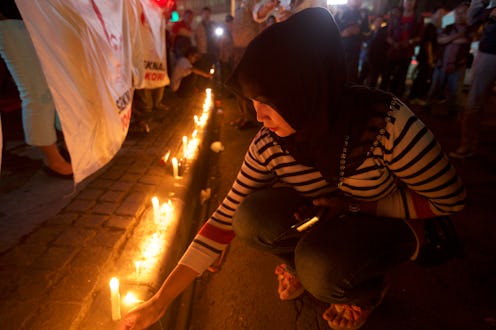News
Nabra Hassanen's Vigil Proves Hate Will Never Silence Muslim Women

The murder of a 17-year-old Muslim teen on Sunday is a startling reminder of the reality that many Muslim-American women live in: a country where anti-Muslim violence and rhetoric has dramatically increased since the 2016 presidential election. While even routine walks to the mosque and rides on public transportation in a hijab can feel threatening, Nabra Hassanen's vigil was a powerful statement against hate, and an empowering reminder that Muslim-American women refuse to be intimidated.
Nearly 1,000 people gathered at a local park in Washington, D.C. on Wednesday to pay tribute to the teen with flowers, signs, and one central message: "Say her name." Community members held banners with the teen's image, and classmates passed around a microphone and took turns describing Hassanen, using words like, "courageous" and "dependable."
Hassanen's friends urged the public not to forget her name, and it's important that we don't — not just because Hassanen was a bright young girl whose life needlessly ended too soon, but because Muslim women should not have to endure violence or harassment simply because of their religion.
"It could have happened to me," one Muslim teen said at Hassanen's funeral. Police have found no evidence that her murder was a "hate crime" or that the suspect targeted her because she was Muslim.
However, community members are finding it difficult to separate her murder from a string of other recent incidents in which Muslim teens have been the target of harassment. Hassanen's father, most notably, told The Guardian that he believes his daughter was murdered because of the fact that she was Muslim.
In fact, violence and hostility towards Muslim-Americans has become all too common. For example, two Muslim girls in Illinois were verbally assaulted at a restaurant earlier this month. A similar incident occurred on a light-rail train in Portland, Oregon in May. According to the Center for the Study of Hate and Extremism, hate crimes like these have risen 20 percent in the past year.
Despite these horrific incidents and statistics, community members gathered at Hassanen's vigil to send the message that they refuse to be intimated or silenced by violence. "I had to let go of my fear and speak out," one Muslim teen told a crowd at the vigil.
Though this fear may not subside anytime soon, members of Hassanen's community collectively joined together on Wednesday to pay tribute, comfort one another, and remind the nation that injustice against Muslim women will not be ignored. The conversation starts by saying Hassanen's name.